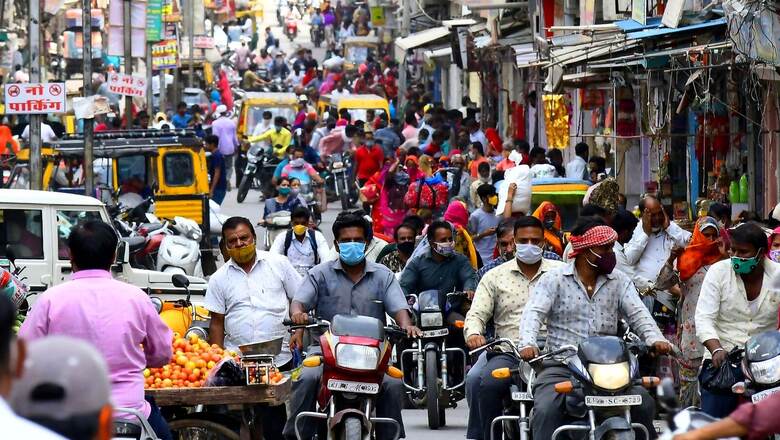
views
Possibly yes!
Virologists and microbiologists believe that the trend shows it is probably the end of the road for the coronavirus pandemic. However, they are quick to add that the farewell of Covid-19 could be the beginning of something new as one does not know the long-term health consequences of even milder coronavirus infections.
We know that fresh infections can certainly rise with new variants which could look like the common cold and flu. There does not seem to be evidence of increased severity, so there is no immediate threat. But in the longer run, there is uncertainty over what these milder infections would mean.
One year on, Omicron continues
In an interview with News18, Dr Raman Gangakhedkar, former Indian Council of Medical Research (ICMR) scientist, clarified that the country had previously seen new waves almost every six months. But in the last year, the same Omicron lineage continues which shows that while the virus is trying to mutate, it is losing its virulence — the lethal characteristics.
Omicron was spotted in November 2021 and one year hence, no variant of concern has been marked, except Omicron’s different lineages that have grabbed headlines. New evolutions have been reported but since they are in the same family, they have not resulted in any increase in hospitalisation rate or severity.
Story of a virus
The virus is an intelligent pathogen and its only objective is to exist in this world. For its existence, it needs a host — a human body.
Killing humans by causing a lethal disease ultimately hampers its own objective. When a human dies, the life of the virus will also come to an end. Hence, the progression of the virus makes it less virulent and more infectious.
For instance, like in the case of Omicron, the virus will keep infecting more and more people and hence living inside more and more human bodies. However, since it is less virulent, the virus will not cause severe disease. Thus, the virus will survive along with the host and keep infecting others.
What’s happening now?
The world is currently undergoing a “convergent evolution”.
For instance, when we turned into humans from apes or monkeys, our tails disappeared or the appendix shrunk. Similarly, these organisms also evolve. Coronavirus is now evolving and changing itself over time which is making it more infectious but less lethal.
Sample this: Omicron was found to have 37 mutations over the initial Wuhan virus, which shows that the virus is trying to bring several changes to sustain itself.
The virus wants to survive by hook or by crook but it has two enemies — the human body’s natural immunity and the immunity given by human-manufactured vaccines.
With Omicron and Delta waves, almost everyone had at least one bout of Covid-19 infection, which means they already have natural antibodies against the virus.
I remember when Gangakhedkar explained coronavirus to me: “This pathogen is very clever. It will find alternative ways to enter our bodies.”
Gangakhedkar, just to add a brief intro, has dealt with viruses his entire career and led many assignments on behalf of ICMR, including the Nipah outbreak in Kerala which showed mortality of more than 89 per cent. His expertise also includes HIV.
“Kabhi policeman bann k aayega… Kabhi advocate bann k aayega… Kabhi daadhi (beard) laga ke aayega ya kabhi daadhi hataa ke aayega [It will disguise as a policeman, sometimes as an advocate; it may come with a beard or without one],” he explained about coronavirus.
Now, across the world, people have received the vaccine against Covid-19. Whenever a virus enters a human body and tries to enter the cells to cause infection, it fails. Due to this failure, it is forced to evolve and bring changes.
Majority of vaccines manufactured across the globe were made to target spike proteins of the virus. From Covishield, mRNA, Corbevax, Sputnik or J&J — these vaccines target the spike protein by stopping the virus from attaching itself to the ACE2 receptors and entering the human cells.
This forces the virus to bring changes in spike proteins as it knows that this is where it is facing issues. The virus this mutates to dodge the vaccine or natural immunity.
Hence, we see new strains with changes in the spike protein patterns. This confirms that for every new strain that will evolve, the vaccine-given immunity against infection will fail.
The virus is fighting for its survival, and so do humans. But till this point, there is no increase in severity or hospitalisation, hence it’s not an issue. It is very unlikely that things will start working differently now, scientists believe.
New strains will, however, keep coming as humans have pushed the virus to the wall as much as it was possible.
Beginning of a new challenge
There does not seem to be evidence of increased severity, hence there is no immediate threat but we don’t know the “long-term consequences,” Dr Anurag Agrawal, former director, CSIR Institute of Genomics and Integrative Biology, told me.
“High-risk people should stay cautious and consider additional boosters, preferably bivalent when available,” he added.
Now the dean of biosciences and health research at Ashoka University, he said: “Nothing much can be done as of now other than being aware. Better vaccines such as nasal vaccines are the long-awaited solution. More of the same (type of vaccines) have diminishing returns.”
Almost half a dozen experts I spoke to agreed that the elderly or people with co-morbid conditions must use a mask in closed or crowded places and avoid getting infected.
Currently, there is limited evidence about the long-term impact on physical, social and emotional functioning after mild or moderate Covid-19 not requiring hospitalisation. But many other studies do indicate that even a mild infection is capable of causing long-term health issues.
Sample this: A study published in Nature found that even a mild case of Covid-19 can increase a person’s risk of cardiovascular problems for at least a year after diagnosis. Another study indicates a change in menstrual cycle length and menstrual volume resulting from Covid-19 infection.
Also, there are a lot of factors associated with long Covid-19 such as chronic obstructive pulmonary disease (COPD), anxiety, depression, migraine, multiple sclerosis, fibromyalgia, benign prostatic hypertrophy, erectile dysfunction, and celiac dysfunction. There could be many other issues which, so far, we are not aware of and may understand as we go along.
The advice thus is that prevention is better than cure.
Read all the Latest India News here




















Comments
0 comment